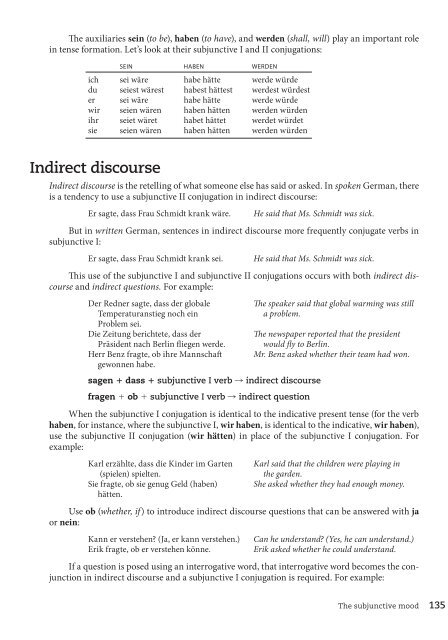german_sentence_builder
You also want an ePaper? Increase the reach of your titles
YUMPU automatically turns print PDFs into web optimized ePapers that Google loves.
The auxiliaries sein (to be), haben (to have), and werden (shall, will) play an important role<br />
in tense formation. Let’s look at their subjunctive I and II conjugations:<br />
SEIN HaBEN WErden<br />
ich sei wäre habe hätte werde würde<br />
du seiest wärest habest hättest werdest würdest<br />
er sei wäre habe hätte werde würde<br />
wir seien wären haben hätten werden würden<br />
ihr seiet wäret habet hättet werdet würdet<br />
sie seien wären haben hätten werden würden<br />
Indirect discourse<br />
Indirect discourse is the retelling of what someone else has said or asked. In spoken German, there<br />
is a tendency to use a subjunctive II conjugation in indirect discourse:<br />
Er sagte, dass Frau Schmidt krank wäre.<br />
He said that Ms. Schmidt was sick.<br />
But in written German, <strong>sentence</strong>s in indirect discourse more frequently conjugate verbs in<br />
subjunctive I:<br />
Er sagte, dass Frau Schmidt krank sei.<br />
He said that Ms. Schmidt was sick.<br />
This use of the subjunctive I and subjunctive II conjugations occurs with both indirect discourse<br />
and indirect questions. For example:<br />
Der Redner sagte, dass der globale<br />
Temperaturanstieg noch ein<br />
Problem sei.<br />
Die Zeitung berichtete, dass der<br />
Präsident nach Berlin fliegen werde.<br />
Herr Benz fragte, ob ihre Mannschaft<br />
gewonnen habe.<br />
sagen 1 dass 1 subjunctive I verb indirect discourse<br />
fragen 1 ob 1 subjunctive I verb indirect question<br />
The speaker said that global warming was still<br />
a problem.<br />
The newspaper reported that the president<br />
would fly to Berlin.<br />
Mr. Benz asked whether their team had won.<br />
When the subjunctive I conjugation is identical to the indicative present tense (for the verb<br />
haben, for instance, where the subjunctive I, wir haben, is identical to the indicative, wir haben),<br />
use the subjunctive II conjugation (wir hätten) in place of the subjunctive I conjugation. For<br />
example:<br />
Karl erzählte, dass die Kinder im Garten<br />
(spielen) spielten.<br />
Sie fragte, ob sie genug Geld (haben)<br />
hätten.<br />
Karl said that the children were playing in<br />
the garden.<br />
She asked whether they had enough money.<br />
Use ob (whether, if) to introduce indirect discourse questions that can be answered with ja<br />
or nein:<br />
Kann er verstehen? (Ja, er kann verstehen.)<br />
Erik fragte, ob er verstehen könne.<br />
Can he understand? (Yes, he can understand.)<br />
Erik asked whether he could understand.<br />
If a question is posed using an interrogative word, that interrogative word becomes the conjunction<br />
in indirect discourse and a subjunctive I conjugation is required. For example:<br />
The subjunctive mood 135



